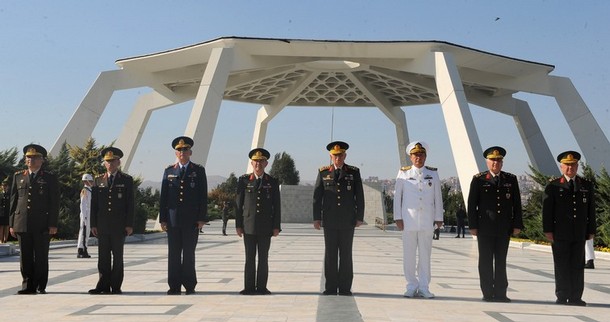
From Ross Wilson, the New Atlanticist: Media reported in Turkey late on July 29 that the Chief of the Turkish General Staff (TGS), General Işık Koşaner, and the military service chiefs under him at Land Forces, the Air Force and the Navy have all submitted their resignations. This comes just ahead of meetings of Turkey’s Supreme Military Council (YAŞ) that convenes in August each year to decide on senior military assignments and promotions. The resignations further the triumph of Prime Minister Erdogan’s authority over the military, but also pose a new and complicated set of challenges for his Justice and Development (AKP) led government going forward. . . .
The fact that the military gave up and decided not to struggle over specifics with the government within the YAŞ, where it has a clear legal role and established prerogatives represents another victory by Erdogan over the military. For the time being, it confirms the prime minister’s authority to not just approve military personnel decisions, but more clearly to evaluate and challenge them if he chooses and to do so not just at the top, but well down the military command chain. Over time, this may ease the ongoing process of civilianizing Turkey’s government and instituting a stronger civilian chain of command atop the military. In the short term, the process will remain highly contentious, of course.
But Turkish government also now faces a crisis of an entirely different nature: all of a sudden, it has no military high command but for the head of the Jandarma, the police force that operates in rural areas. This is not a trivial matter. The Jandarma has the domestic lead on PKK terrorist violence at home, but Turkey is not uninterested in the PKK-related turmoil on the Iranian border with northern Iraq just south of Turkey. The Army remains deployed in the south to assist refugees from Syria and to deter unauthorized border crossings, including possibly hot pursuit by the Syrian military. The Navy is deployed with NATO in the Mediterranean to monitor the blockade of Libya. So Prime Minister Erdogan has to resolve this crisis with the military in a way that preserves his hard-won gains vis-à-vis the military while also ensuring that he gets capable officers to take the top commands and does so quickly lest any sense of ongoing crisis linger in ways that could affect his maneuvering room on the issues he wants to contest in the coming months, especially the matter of a new constitution. This may prove hard, and the crisis at the top of the Turkish national security structure may well persist for some time. Turkey will survive, and the military will remain in its barracks, but Ankara will be a hot, tense and contentious place in August – at a time when most Turks hoped to be focused on vacations abroad or Ramadan at home.
Ross Wilson is Director of the Dinu Patriciu Eurasia Center at the Atlantic Council and former Ambassador to Turkey and Azerbaijan. (photo: Reuters)
Image: turkish_military.jpg
